NVIDIA GeForce GTX 690 Review: Ultra Expensive, Ultra Rare, Ultra Fast
by Ryan Smith on May 3, 2012 9:00 AM ESTCrysis: Warhead
Kicking things off as always is Crysis: Warhead. It’s no longer the toughest game in our benchmark suite, but it’s still a technically complex game that has proven to be a very consistent benchmark. Thus even four years since the release of the original Crysis, “but can it run Crysis?” is still an important question, and the answer when it comes to setups using a pair of high-end 28nm GPUs is “you better damn well believe it.”
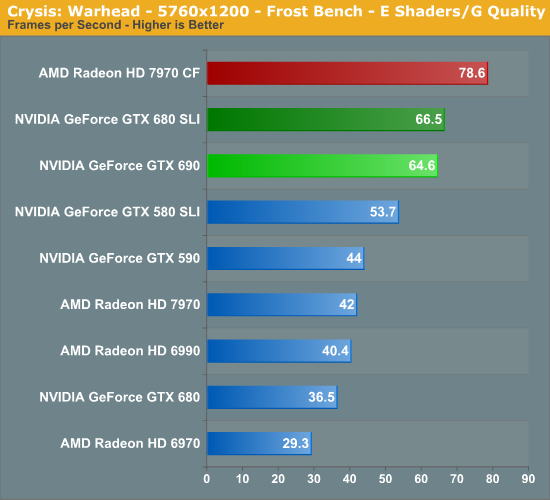
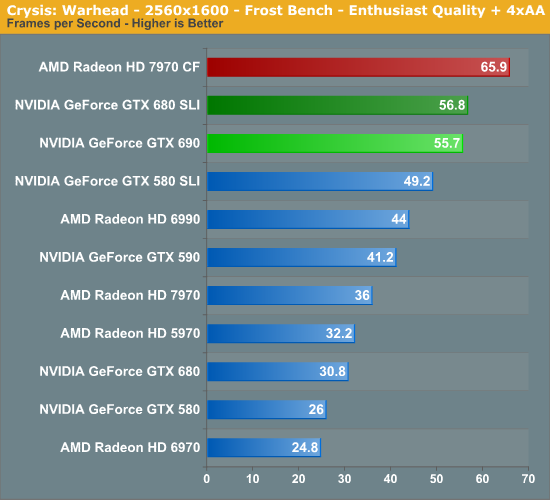
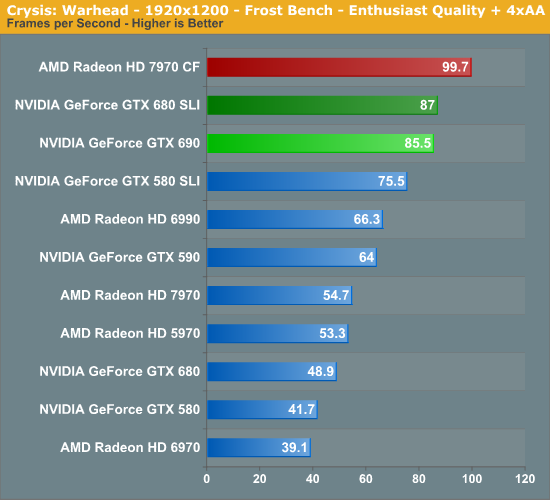
Crysis was a game that Kepler didn’t improve upon by a great deal compared to the Fermi based GTX 580. NVIDIA sees some good SLI scaling here, but AMD’s performance lead with a single GPU translates into an equally impressive lead with multiple GPUs; in spite of all of its capabilities the GTX 690 trails the 7970CF by 18% here. So long as AMD gets good Crossfire scaling here, there’s just no opening for Kepler to win, allowing AMD to handily trounce the GTX 690 here.
As for the intra-NVIDIA comparisons, the GTX 690 does well for itself here. Performance relative to the GTX 680 SLI at 2560 is 98%, which represents a 77% lead over the GTX 680. Overall performance is quite solid; at 55.7fps we’re nearly to 60fps on Enthusiast quality at 2560 with 4x MSAA, which is the holy grail for a video card. Even 5760 is over 60fps, albeit at lower quality settings and without AA.
It’s taken nearly 4 years, but we’re almost there; Crysis at maximum on a single video card.
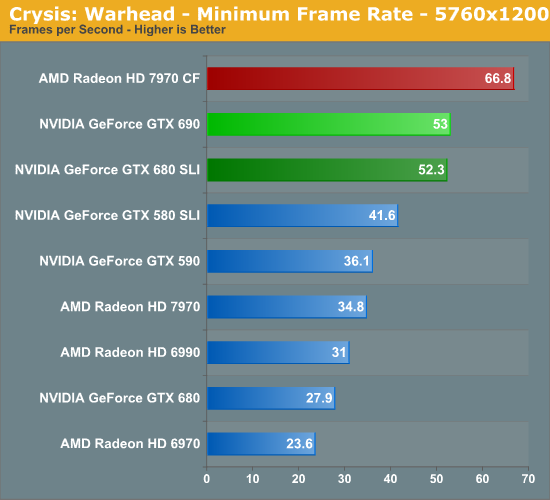
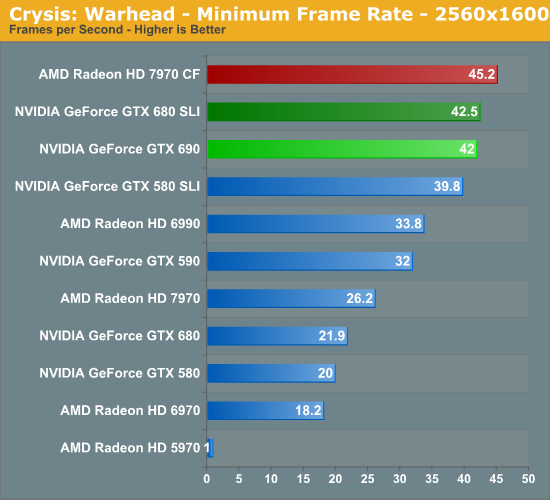
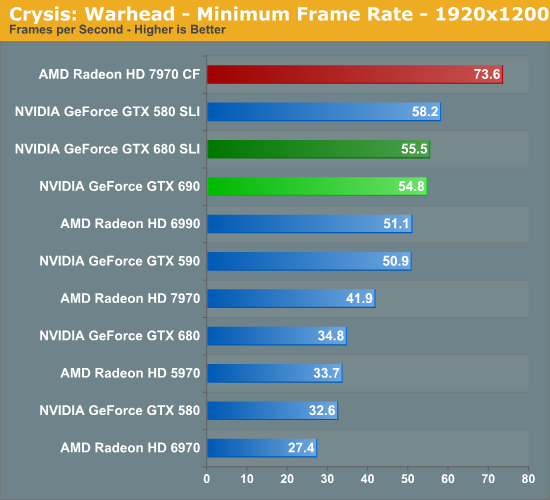
Our minimum framerates are much the same story for NVIDIA. The GTX 690 once again just trails the GTX 680 SLI, while interestingly enough the dual-GPU NVIDIA solutions manage to erode AMD’s lead at a single point: 2560. Here they only trail by 8%, versus 20%+ at 5760 and 1920. Though at 1920 we also see another interesting outcome: the GTX 580 SLI beats the GTX 680 SLI and GTX 690 in minimum framerates. This would further support our theory that the GTX 680 is memory bandwidth starved in Crysis, especially at the lowest performance points.










200 Comments
View All Comments
CeriseCogburn - Friday, May 4, 2012 - link
I disagreechadwilson - Thursday, May 3, 2012 - link
I have some issues with this article, the first of course being availability. Checking the past week, I have yet to see any availability of the 680 besides $200+ over retail premium cards on ebay. How can you justify covering yet another paper launch card without blaring bold print caveats, that for all intents and purposes, nVidia can't make for a very long time? There is a difference between ultra rare and non-existant.Is a card or chip really the fastest if it doesn't exist to be sold?
Second, the issue of RAM, that's a problem in that most games are 32 bit, and as such, they can only address 3.5GB of RAM total between system and GPU RAM. This means you can have 12GB of RAM on your video card and the best you will ever get is 3GB worth of usage.
Until games start getting written with 64 bit binaries (which won't happen until Xbox 720 since almost all PC games are console ports), anything more than 2-3GB GPU RAM is wasteful. We're still looking at 2014 until games even START using 64 bit binaries.
Want it to change? Lobby your favorite gaming company. They're all dragging their feet, they're all complicit.
Ryan Smith - Thursday, May 3, 2012 - link
Hi Chad;While I'm afraid we're not at liberty to discuss how many 680 and 690 cards NVIDIA has shipped, we do have our ears to the ground and as a result we have a decent idea as to how many have shipped. Suffice it to say, NVIDIA is shipping a fair number of cards; this is not a paper launch otherwise we would be calling NVIDIA out on it. NVIDIA absolutely needs to improve the stock situation, but at this point this is something that's out of their hands until either demand dies down or TSMC production picks up.
-Thanks
Ryan Smith
silverblue - Thursday, May 3, 2012 - link
The 690 is a stunning product... but I'm left wanting to see the more mainstream offerings. That's really where NVIDIA will make its money, but we're just left wondering about supply issues and the fact that AMD isn't suffering to the same degree.CeriseCogburn - Sunday, May 6, 2012 - link
A single EVGA GTX680 sku at newegg has outsold the entire line up of 7870 and 7850 cards combined with verified owners reviews.So if availability is such a big deal, you had better ask yourselves why the 7870 and 7850 combined cannot keep pace with a single EVGA 680 card selling at Newegg.
Go count them up - have at it - you shall see.
108 sales for the single EVGA 680, more than the entire combined lot of all sku's in stock and out of the 7870 and 7850 combined total sales.
So when you people complain, I check out facts - and I find you incorrect and failing almost 100% of the time.
That's what happens when one repeats talking points like a sad PR politician, instead of checking available data.
ltcommanderdata - Thursday, May 3, 2012 - link
Have you considered using WinZip 16.5 with it's OpenCL accelerated file compression/decompression as a compute benchmark? File compression/decompression is a common use case for all computer users, so could be the broadest application of GPGPU relevant to consumers if there is an actual benefit. The OpenCL acceleration in WinZip 16.5 is developed/promoted in association with AMD so it'll be interesting to see if it is hobbled on nVidia GPUs, as well as how well if scales with GPU power, whether it scales with SLI/dual GPU cards, and whether there are advantages with close IGP-CPU integration as with Llano and Ivy Bridge.ViRGE - Thursday, May 3, 2012 - link
Doesn't WinZip's OpenCL mode only work with AMD cards? If so, what use would that be in an NVIDIA review?ltcommanderdata - Thursday, May 3, 2012 - link
I actually don't know if it's AMD only. I know AMD worked on it together with WinZip. I just assumed that since it's OpenCL, it would be vendor/platform agnostic. Given AMD's complaints about use of vendor-specific CUDA in programs, if they developed an AMD-only OpenCL application, I would find that very disappointing.ViRGE - Thursday, May 3, 2012 - link
Going by their website it's only for AMD cards."WinZip has been working closely with Advanced Micro Devices (AMD) to bring you a major leap in file compression technology. WinZip 16.5 uses OpenCL acceleration to leverage the significant power of AMD Fusion processors and AMD Radeon graphics hardware graphics processors (GPUs). The result? Dramatically faster compression abilities for users who have these AMD products installed! "
CeriseCogburn - Friday, May 4, 2012 - link
Oh, amd the evil company up to it's no good breaking of openCL misdeeds again.Wow that's evil- the way it's meant to be unzipped.